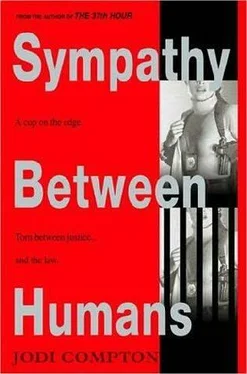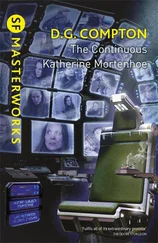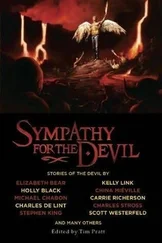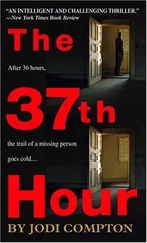I wasn’t a connoisseur of bicycles, but hers was lovely: a frame painted in a metallic-tangerine color, narrow tires for speed, and drop handlebars mounted upside down, so that they curved back like ram’s horns. The effect was ruined only by a pair of bulging saddlebags, one on each side of the front wheel, making the bike look like a racing Thoroughbred pressed into packhorse duty.
“Hi,” Marlinchen said. “I just got back from the store.” The color in her cheeks was high but healthy, and there was a sheen of sweat on her face.
“You know,” I told her, “the way you have those handlebars mounted may look sexy, but you’re not going to feel so good when the end of one of them is embedded in your kidney after an accident.”
Marlinchen made a little face at me. “Don’t be such a cop,” she said. “Did you know that a lot of bike messengers don’t even have brakes on their rides anymore?”
My first thought was, Cool. But I kept my disapproving look in place, saying instead, “That’s their problem. If I were you, I’d go to wherever you get this bike worked on and have the handlebars turned back around.”
“I work on it myself,” she said, sitting on her heels to unload one of the saddlebags. “Taking it to the shop is expensive, and Dad’s useless with tools.” She set a white plastic grocery bag on the ground, then crossed to the other saddlebag.
“So you took the handlebars off, disconnected and reconnected the brakes, and everything?”
A flicker of sadness crossed her face. “Aidan and I did the handlebars together,” she said. “Just before he left.” She picked up the grocery bags.
“That’s why I’m here,” I said. “I wanted to bring you up to date on Aidan. There’s not much new,” I added hastily, “but I’d like to talk about some things.”
I followed her inside and to the kitchen, where she set the groceries on the counter. “Want to go on the back porch?” Marlinchen asked. “It’s nice out.”
It was a pleasantly crisp day, with recent rains having cleared all the humidity out of the air. Somewhere a power mower droned, and dandelion and cottonwood fluff rode the breezes.
“I have something for you,” I said, and took out the photo of Aidan I’d printed from my e-mail, handing it across the wooden picnic table.
“Oh, my God,” Marlinchen said. She took the piece of paper from me by the edges, as though it might break. “You were right. He does look different.”
In the photo, Aidan’s face had gained some adult length of bone and thinned a bit; the main difference between this Aidan and the 11-year-old was that this one had hair pulled back, out of sight, suggesting length.
“Where did you get this?” she said.
“It wasn’t great detective work,” I told her. “It’s a yearbook photo, that’s all.”
But I wanted to have a picture of her brother before her while we talked. It would remind her what this whole thing was about.
“I haven’t learned much,” I said. “I’ve talked to Deputy Fredericks and Pete Benjamin, and done what I can, but I’ve been kind of hobbled.”
“Because of the distance involved and the jurisdictional lines,” Marlinchen said.
“Partly,” I agreed, “but there are other problems, closer to home.”
“Like what?”
“The question I keep coming back to,” I said, “is why Aidan was sent away in the first place.”
Marlinchen shifted her weight. “It was an arrangement of convenience,” she said. “Dad just had his hands too full.”
“So you’ve said,” I told her. “So has Colm. And Liam. You’re all in agreement on this. Perfectly in agreement, as if you’d discussed it in advance.”
Marlinchen looked down, at a fingernail slightly discolored by grease from her bicycle chain. “Couldn’t that mean,” she said stiffly, “that it’s the truth?”
“Is it?” I said. “Did you know the author bio for A Rainbow at Night says that your father has four children?”
She knew, instantly, what I was talking about. “It says he lives in Minnesota with his four children,” she said quickly. “That’s technically true.” She meant that Aidan had been sent away by the time of Rainbow ’s publication.
“It still makes it sound like your father has only four kids,” I said.
“Dad doesn’t even write those things,” Marlinchen said. “Somebody at his publisher does.”
“Based on information from who?” I said.
An outboard engine hummed on the lake in a bouncing rhythm, as though it were bucking waves.
“You and your brothers all say that you haven’t seen Aidan in five years,” I went on. “Not a phone call, not a letter, not a visit home for the holidays. That’s not an arrangement of convenience. That’s banishment, Marlinchen. Aidan hasn’t just been erased from your father’s bio. He’s been erased from your lives.”
Marlinchen’s color was still high, and I didn’t think it was left over from the exertion of her ride. “You’re making way too much of this,” she said. “Fostering out children used to be a common tradition. Your own father did it, you said.”
“My father was a truck driver. He was on the road the better part of the year. It’s not a comparable situation,” I said. “Did Aidan do something? Was there some reason your father thought he needed to be isolated in Illinois, and then Georgia?”
“No,” she said softly. “He didn’t do anything.” The sudden quietness of her voice was like barometric pressure dropping.
“What about your father, then?” I said. “If this wasn’t about Aidan, was it something to do with him?”
“No,” Marlinchen said, even more quietly.
“Okay, I get it,” I said. “Everybody loves everybody, and then suddenly Aidan’s sent away permanently to live with virtual strangers. Yeah, that makes perfect sense.”
“I don’t understand what you’re getting at,” Marlinchen said, her voice rising at last. “You’re not supposed to be psychoanalyzing my family, you’re supposed to be finding Aidan. Instead you haven’t done anything except find a yearbook photo and cast slights on my brother’s character and my father’s!”
I sat back slightly. As long as I’d known her, Marlinchen had been almost achingly polite. Now the Marlinchen who was emerging from that shell wasn’t the one I’d expected: an imperious princess, giving orders to a member of the servant class.
“You know what?” I said. “I’ve done about as well as anyone could with the constraints you’ve put on me. You want to feed me half-truths and pretend it won’t impede my search for Aidan. You’re half interested in finding Aidan and half interested in protecting your father’s image. You’ve got one foot on each horse, and you’re trying to pretend they’re running in the same direction.”
I’d expected her anger to completely boil over, but that wasn’t what happened. Some women, particularly small ones, learn to wield exquisite courtesy like a weapon. Suddenly, she seemed to draw on a reservoir of poise. When she spoke, I heard a thousand closed doors in her voice.
“I know you’ve done everything you can, Detective Pribek, and spent more time than you can afford,” she said. “I’m sure my father will want to thank you, when he’s fully recovered.”
“Marlinchen, I’m not saying that-”
“I’m sorry,” she said, “I really have to put the groceries away.”
Then she was gone, the French doors closing firmly behind her.
Marlinchen was the last personI should have come off second best to in an interview situation; she was just a kid. But she outclassed me; that was the problem. For all that I wore the authority of a county detective, I was still keenly aware of my rough edges when the job took me into the graceful homes and worlds of middle- and upper-class citizens, especially those like Marlinchen, who wore the intellect she’d inherited from her father as comfortably as she might have worn family jewels. She was the princess, in her shabby-elegant old castle on a shining lake, and I, a civil servant, was the commoner, feeling obligated to help her for reasons I didn’t fully understand.
Читать дальше












